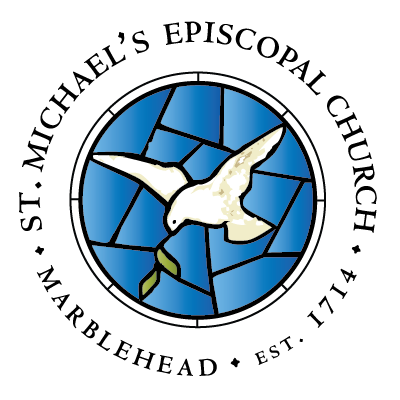Evangelism during COVID-19
St. Michaels’ recorded service of Morning Prayer for the Fifth Sunday of Easter has received 101 views at the time of this posting.
We are clearly reaching more individuals than we have been in the past few years during the average Sunday morning service. How do we understand this increase in numbers? What does this mean for Evangelism (sharing the Good News) and Welcoming? Are we seeing a greater response to our offerings because of the crisis? Because we have increased the visibility and accessibility of our offerings? We are seeing an increase in engagement with the life of the parish through digital means, but without significantly changing the tone or content of our liturgy (with the exception of the administration of Holy Eucharist for reasons of health and safety). What can we learn from these numbers about how to continue to be open and welcoming to those who seek the love of God and the embrace (even if virtual!) of beloved community?
The Episcopal Church is certainly grappling with these questions across the country.
Presiding Bishop Michael Curry and Canon Stephanie Spellers recently joined members of the Diocese of Los Angeles on a Zoom call, discussing “ the church post-COVID-19 and Curry’s signature Way of Love as a lens through which to explore the opportunities and challenges created by coronavirus. The Way of Love is a sevenfold rule of life that embraces the ancient spiritual practices of disciples — Turn, Learn, Pray, Worship, Bless, Go, and Rest— amid the power of gathering with others for love and support in living those commitments.”
The full article is worth the read, but we have excerpted the portion on Evangelism during COVID-19 below.
An “evangelism moment” exists in the huge spike many congregations have experienced in virtual worship views versus pre-COVID-19 in-person Sunday attendance, [Presiding Bishop Michael] Curry said.
But the moment transcends merely attempting to boost Episcopal Church rolls. “It is not about us, but really, it is about Jesus, about God. Evangelism is about joining others on that deeper journey into God,” he said.
As congregations have grown adept at digital worship, they have been led into “online relationship with many people who might never pass through the doors of our physical building,” Curry said. “And the reason we have is because we were where they are. They noticed us even if they’d never heard of The Episcopal Church because of that deep spiritual hunger for a relationship with God.”
The increased attendance — 1 million viewers tuned in to Easter Day services at the Washington National Cathedral — creates an opportunity to share the faith and to help heal a hurting and grieving world — the Blessing and Go components of the Way of Love, Curry said.
“Little churches doing Morning Prayer are getting numbers higher than the people in their congregations,” Curry said. “So how do we nurture that?’
[Canon Stephanie] Spellers cited other opportunities. “Jesus is saying I want you for the whole discipleship journey — including worship, but not only worship. Are we providing bible study that gets people to the core [of faith]? Are we helping people to learn to pray, and not just corporate prayer? Are people learning a way of placing their lives in the hands of God because they need to?
“The reason they’re showing up in droves online is Jesus, God, and love and hope and prayer,” she said. “They want to know how to pray for those they love who are dying.”
She said witnessing “essential” workers leave and return daily on public transportation in her Harlem neighborhood inspires her to bless and to stand in solidarity with them. “Every one of those essential workers — God love them — is risking their lives. Are we blessing them and calling what they do a blessing?”
She suggested that clergy investigate advocacy opportunities through The Episcopal Church Office of Government Relations. People can contact the U.S. Congress to say, “You don’t crucify these folks on my watch, because that’s Jesus you’re doing that to,” she said.
Although stay-at-home orders are still in effect, “conversations about who’s being left out can still be held,” Curry added. “Are there ways we can be supportive in prayer? Digital advocacy is another option, lobbying Congress to make sure needs of poor are considered in relief packages.”
“I am concerned about the ugliness of unenlightened self-centeredness, that could easily raise its head again,” Curry said. “Then we start casting some aside and throwing some overboard. And some become expendable people, for the economy or for whatever. That’s the downside of something like this, especially the longer it goes on.”
He announced that the Los Angeles diocese will be participating in The Episcopal Church’s racial justice audit, which aims to get a true count of the racial makeup of the church.
Spellers suggested adapting time-tested ministries as a way to deepen relationships with virtual visitors: for example, developing a digital equivalent of ushers and greeters.
“If they were to come to church on Sunday morning, there’d be somebody at the door ready to greet them,” she said. “Is there someone who’s been designated on Sunday to scroll through the chat thread to catch when people have questions? Is there some way you are providing them with an email address so they can do follow-up? There should be a note in that area — ‘if you’d like to know more about this congregation and our life together, email us.’”
She also suggested announcements, letting visitors know about upcoming bible studies and other church Zoom events. Other opportunities include Zoom small group ministries, forming house churches. “We hear people saying they need an anchor.”
An excerpt from Presiding Bishop, Canon Stephanie Spellers address historic L.A. clergy conference by The Rev. Canon Pat McCaughan, posted on the website of the Episcopal Diocese of LA.
